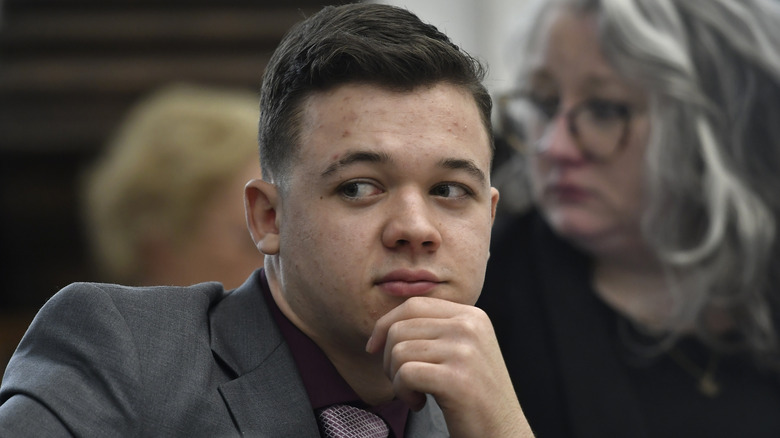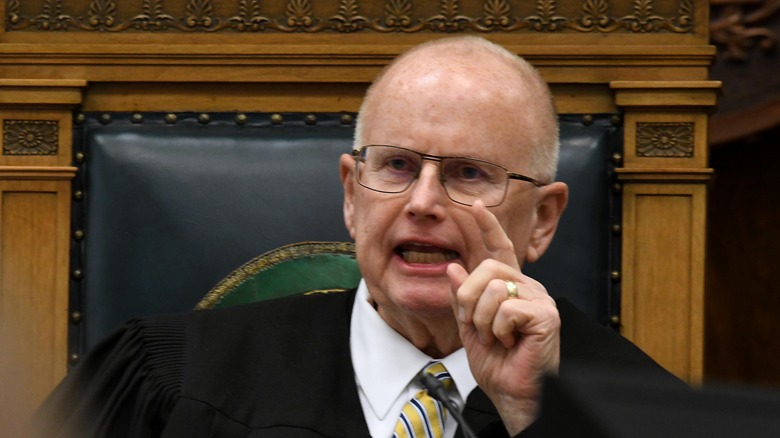The Truth About Rittenhouse Trial Judge, Bruce Schroeder
When court drama makes its way to the headlines, it's usually centered on smoking-gun evidence or bombshell testimony. It's very rarely about the actions of a judge, but that's exactly what happened earlier this week in the Kyle Rittenhouse trial.
For a brief refresher of the case, 18-year-old Kyle Rittenhouse is facing several charges — including murder — after fatally shooting two men and wounding a third during the civil unrest that befell Kenosha, Wisconsin, in the summer of 2020. Rittenhouse and his legal team have argued that he was acting in self-defense.
The case has been incredibly polarizing for both the public and the media, and perhaps it's little surprise that such tensions have bled into the courtroom. One major example of this was Judge Bruce Schroeder's takedown of the prosecuting attorney for arguing that Rittenhouse's silence after being arrested suggested he was guilty.
"I was astonished when you began your examination by commenting on the defendant's post arrest silence," Schroeder said, as reported by Law & Crime. "That's basic law. It's been basic law in this country for 40 years, 50 years. I have no idea why you would do something like that ... I don't know what you're up to." He also brought up the possibility of ordering a mistrial.
In light of the verbal sparring between the judge and the prosecutor, legal watchers have been curious about Schroeder's own history as a judge.
Judge Schroeder: old school or biased?
Though accounts about Judge Bruce Schroeder's reputation do vary a little, there does seem to be a common theme: his old-school nature. According to The New York Times, he is the longest-serving circuit court judge in Wisconsin, and even remarks himself that he has been "in this business" for over 50 years. He also reportedly has a strong reverence for the legal system, and one lawyer noted that his commitment means he doesn't get "pushed around by either party," per CNN.
Schroeder's zeal doesn't just apply to himself; he also allegedly gives speeches to the jury about taking their civic duty seriously, even comparing it to serving in the army.
But some have argued that Schroeder does have his biases. For starters, he is known for giving harsh sentences. In addition, his knowledge (or lack thereof) of some current events has called his judgment into question. For example, he claimed that he had never heard of the Proud Boys group until this trial.
While the judge does have a reputation for being old-school and an "independent thinker," that doesn't mean that he doesn't have a cheeky side. For example, he won fans across the country when he pulled out a copy of a cookie catalog called "Cookie Book" to read during a 10-minute court recess, per Newsweek. He also is known for playing trivia with those on jury duty to liven up the empty time during the pre-trial selection process.
He doesn't shy away from controversial opinions
It should be noted that the Kyle Rittenhouse case is a trial-by-jury, and therefore it will be 12 civilians who judge whether Rittenhouse is innocent or guilty of his various charges. However, should the jury vote guilty, Judge Schroeder will decide the severity of the punishment. Deliberations on the Rittenhouse trial will reportedly begin on Monday, per NBC Chicago.
While there is no crystal ball to guess the judge's potential sentence for Rittenhouse following a possible guilty verdict, Schroeder's legal history has made clear that he isn't afraid of making potentially unpopular decisions. Judge Schroeder ruled back in the late 1980s that a "child molester who also engaged in prostitution [get] an AIDS test," per CNN. Schroeder cited concerns that the convicted sex worker could be spreading the virus, but the case unsurprisingly drew scrutiny, especially considering the taboo surrounding AIDS at the time.
Schroeder also controversially decided in a 2008 case that a "letter from the grave" could be submitted as evidence in a trial where a man was accused of murdering his wife with anti-freeze. The wife had written a letter before her death that stated that her husband was likely responsible if she mysteriously died. The letter ended up being a key piece of evidence that earned the man a guilty verdict. However, the Wisconsin Supreme Court later ruled that the letter should never have been allowed into evidence.


